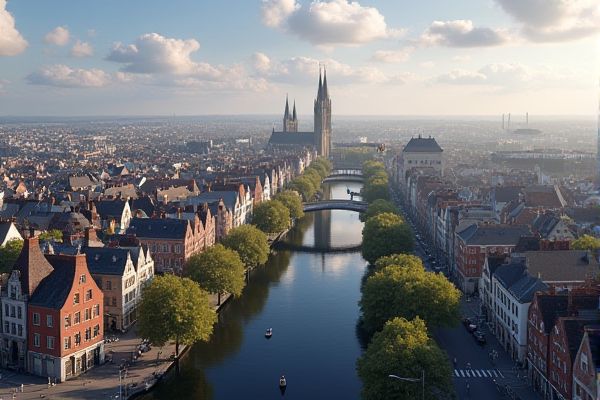
Moving to Belgium checklist: Secure necessary visas and permits. Register with local municipality. Find suitable housing options. Open a Belgian bank account. Research Belgian healthcare system. Learn essential Dutch or French phrases. Understand local transportation options. Familiarize with Belgian taxation system. Obtain Belgian phone number. Know cultural etiquette and customs.
Secure necessary visas and permits.
To move to Belgium, you need to secure the appropriate visa and permits, such as a Schengen visa for short stays or a long-stay Type D visa for stays over 90 days, and potentially a work permit (Type A, B, or C) if you are not an EU or EEA citizen. Applications must be submitted at the Belgian embassy or consulate in your home country, and additional documentation like proof of employment, residence, and financial means may be required. For more detailed information, visit the Allianz Care's Visas for Belgium guide.
Register with local municipality.
To register with the local municipality in Belgium, you must visit the local municipal office within eight days of your arrival. During this process, you are required to submit essential documents such as your passport, lease agreement, and proof of health insurance. Additionally, a local police officer will conduct a residence verification check before you receive your Belgian residence card. For more detailed information and guidance, you can visit the Registering Your Address page on the TalkPal website.
Find suitable housing options.
To find suitable housing options in Belgium, consider using online property portals like Immoweb, Spotahome, and BBF Apartments. Decide between renting unfurnished apartments, furnished serviced apartments, or shared flats and co-living spaces, with rental prices varying by location. For instance, rental prices can be around EUR850 for a one-bedroom apartment in Brussels, whereas in smaller cities it might be approximately EUR700. For detailed guidance on the rental market, explore resources like Rent In Belgium, which provides comprehensive information for expats navigating the housing landscape in Belgium.
Open a Belgian bank account.
To open a Belgian bank account, you need to provide proof of identity, such as a passport or ID card, and proof of address. This process can be completed either online or in person at a bank branch. Additionally, some banks offer the convenience for non-residents to open accounts even before moving to Belgium. For more detailed guidance on this process, you can visit the article on Opening a Bank Account in Belgium, which offers comprehensive information catering to expatriates looking to navigate banking services in the country efficiently.
Research Belgian healthcare system.
Belgium has a high-quality, universal healthcare system divided into public and private sectors, requiring all residents to register for health insurance. The system is characterized by freedom of choice, direct access to healthcare providers, and a fee-for-service payment structure, with contributions to Health Insurance Funds proportional to income.
Learn essential Dutch or French phrases.
To prepare for moving to Belgium, it is crucial to learn the local languages, either Dutch or French, depending on the region you plan to live in. Learning essential phrases can be done through apps, language schools, or online resources, and understanding the linguistic differences between Standard French and Belgian French, or between Dutch in the Netherlands and Flemish in Belgium, can be very helpful. For more comprehensive guidance on relocating, you can explore resources such as Expatica for detailed information about the process.
Understand local transportation options.
In Belgium, public transportation includes a comprehensive rail network managed by SNCB, bus services handled by De Lijn in Flanders, TEC in Wallonia, and STIB-MIVB in Brussels, as well as tram and metro services in several cities. Additional options include taxis, waterbus services, and extensive cycling infrastructure with bike-sharing networks. For more information on the transportation options available, you can visit the official Belgium Mobility website which provides detailed insights and guidance.
Familiarize with Belgian taxation system.
To familiarize yourself with the Belgian taxation system, it's important to understand that Belgium employs a progressive taxation system with rates ranging from 25% to 50% based on income level. Consider factors such as taxable income types, which include employment, investment, pension, rental, and self-employment income. Tax residency, municipal taxes, and potential tax refunds are also vital aspects. Additionally, those interested in specific tax rules for expatriates should take note of the available deductions, allowances, and the use of tax treaties to mitigate double taxation. For detailed insights into these processes, you might want to explore the Belgian Expat Taxation Guide which provides comprehensive guidance on navigating these financial obligations effectively.
Obtain Belgian phone number.
To obtain a Belgian phone number, you need to provide specific documentation depending on whether it is for personal or business use. For personal registration, you must provide your full name, contact phone number, and a copy of your passport or ID. Meanwhile, for business registration, you need to include your company name, VAT number, and a copy of your company incorporation certificate, along with a valid address and utility bill. Visit FlyNumber for more details on acquiring your virtual phone number in Belgium.
Know cultural etiquette and customs.
To navigate cultural etiquette and customs in Belgium, it is crucial to understand that Belgians value family, cleanliness, and personal appearance. Key customs include dressing conservatively, using proper table manners, bringing appropriate gifts (such as flowers or chocolates, but not chrysanthemums), and respecting formalities in social and business settings. For a comprehensive understanding of these practices, you may refer to the Belgium Guide, which offers detailed insights into the cultural norms of the country.
